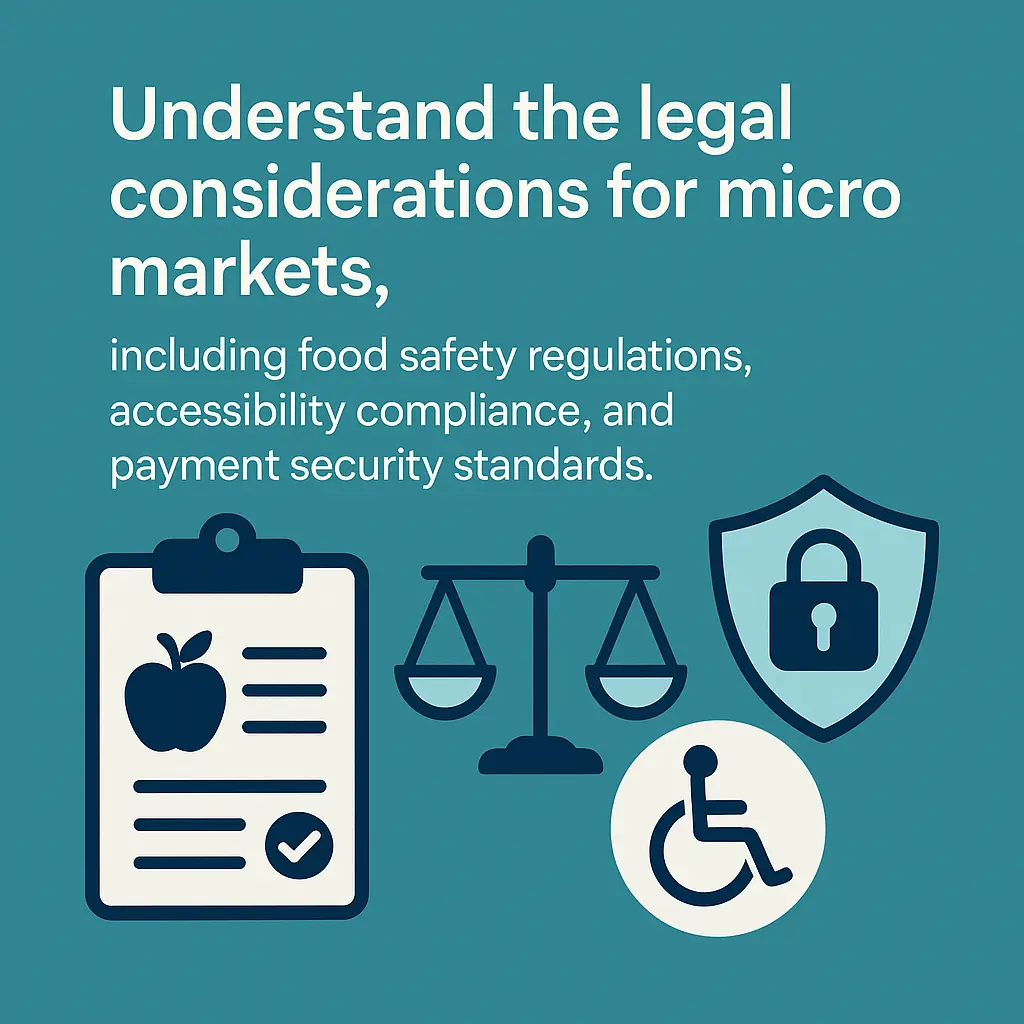Legal Aspects of Operating Micro Markets
Understand the legal considerations for micro markets, including food safety regulations, accessibility compliance, and payment security standards.
Back to Micro Market Services ResourcesUnderstand the legal considerations for micro markets, including food safety regulations, accessibility compliance, and payment security standards.
Back to Micro Market Services ResourcesOperating a micro market involves adhering to various federal, state, and local regulations. Successfully navigating these legal aspects ensures smooth operations, protects consumers, and avoids potential liabilities.
![]() Ensuring food safety and proper handling to meet health codes
Ensuring food safety and proper handling to meet health codes
![]() Complying with accessibility standards to serve all patrons
Complying with accessibility standards to serve all patrons
![]() Securing payment transactions to protect customer data
Securing payment transactions to protect customer data

Micro markets offer significant convenience and variety, transforming breakrooms into self-service retail environments. However, their operation comes with a unique set of legal and regulatory responsibilities. Businesses considering or already operating micro markets must be diligent in understanding and adhering to these requirements to ensure safe, ethical, and lawful service.
One of the most critical legal aspects for micro markets falls under food safety. These unattended retail spaces often offer perishable items, requiring strict adherence to local and federal health codes. This includes proper handling, storage temperatures, clear expiration dating, and accurate labeling of ingredients and allergens. Regular inspections by health departments are common, making it essential to maintain impeccable standards. Understanding how to track inventory and manage product freshness is key to avoiding health violations. For more details on managing inventory, consider reading about inventory management in micro markets.
Just like traditional retail, micro markets must comply with accessibility standards, such as the Americans with Disabilities Act (ADA). This means ensuring that pathways are wide enough, shelves are reachable, and payment kiosks are usable by individuals with various disabilities. Beyond physical access, payment security is paramount. Micro markets process sensitive financial data, necessitating compliance with the Payment Card Industry Data Security Standard (PCI DSS). This protects customers from fraud and ensures data integrity. Operators should also be aware of the security and loss prevention features in AI coolers, which often integrate advanced payment security.
Operating a micro market often requires obtaining various business licenses and food service permits, which can vary significantly by state and municipality. It's crucial to research and secure all necessary documentation before launch. Furthermore, the contracts established with micro market providers must clearly delineate responsibilities for compliance, liability, and service expectations between the location host and the operator. These contracts should cover everything from maintenance schedules to incident response. Exploring understanding vending service contracts can provide valuable insights into necessary contractual elements.
Adhering to these legal aspects not only safeguards your business but also builds trust with your employees and customers. Proactive compliance is the best approach to successful micro market operation.
Key legal concerns include food safety regulations, accessibility compliance (ADA), payment security (PCI DSS), and local business licensing requirements.
Micro markets typically fall under retail food establishment rules, requiring proper food handling, temperature control, labeling, and regular inspections to prevent foodborne illness.
Yes, micro markets must be accessible to individuals with disabilities, including clear pathways, reachable shelves, and accessible payment kiosks in accordance with ADA guidelines.
Micro markets that process credit card payments must comply with PCI DSS (Payment Card Industry Data Security Standard) requirements to protect customer financial data.
Operators may need general business licenses, food service permits, and health department approvals, which vary by city and state.
Micro markets must collect and remit sales tax on applicable items, and operators must comply with all local, state, and federal tax laws, including income reporting.
Yes, pre-packaged foods must meet FDA labeling standards for ingredients, allergens, nutrition facts, and date marking. Freshly prepared items may have additional requirements.
While surveillance helps prevent theft, operators must ensure cameras are used legally and ethically, with clear signage about monitoring to respect privacy and comply with relevant laws.
Contracts should clearly outline responsibilities for compliance, including who is liable for food safety, payment security, maintenance, and adherence to regulations between the location owner and the micro market operator.
Generally, micro markets are not ideal for age-restricted products like alcohol or tobacco due to their unattended nature. If offered, strict age verification technology and local licensing are mandatory.